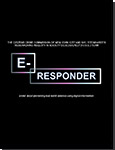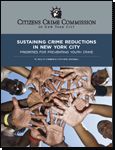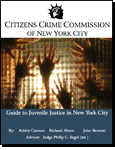
|
|
E-Responder Evaluation: Cultivating Resilience and Sociopolitical Empowerment (2017)
E-Responder was developed by the Crime Commission in partnership with NYU and NYC Cure Violence to intervene with youth in new, virtual spaces of conflict. This third and final evaluation demonstrates that E-Responder had significant effects on two critical outcomes, both of which are predicted to facilitate positive long-term results for youth: (1) resilience, by building on youths' existing strengths, coping skills and empowering them to face adversity and grief; and (2) sociopolitical awareness, by providing youth with the vocabulary and opportunity to discuss topics such as inequality, oppression, privilege and race. The findings from the three research briefs demonstrate the effectiveness of E-Responder as an intervention engaging youth online, where they are highly involved and literate and moreover, that E-Responder is more than an intervention model; it is an early-prevention strategy.
» read the report
|

|
|
E-Responder Poster: Interruptions of Risky Online Behavior De-escalate Violent Conflict (2017)
E-Responder was presented at the Society for Community Research and Action (SCRA) 2017 Biennial Conference "Transformative Community Psychology" in Canada to discuss the innovative approach of conducting intervention through social media, research study, and results.
» read the poster
|

|
|
Testimony: The Laws Governing the Age of Adult Criminal Responsibility (2016)
The Crime Commission's testimony to the New York State Legislature in support of raising the age of criminal responsibility to 18 years old.
» read the testimony
|

|
|
Sustaining Crime Reductions in New York City: Priorities for Preventing Youth Crime (2015)
New York City's success at driving crime down to unprecedented lows has ushered in a new era of policing: one in which more time is spent preventing crimes than reacting to them. In this report, the Crime Commission recommends that to sustain these crime reductions, the police and the growing body of responsible stakeholders should prioritize efforts that address youth victimization and exposure to violence; develop the youth workforce; enhance legitimacy; break down silos to improve coordination; and address the negative impacts that state and local policies have on youth.
» read the report
|

|
|
Testimony: The Laws Governing the Age of Adult Criminal Responsibility (2013)
Crime Commission Director of Public Policy Ashley Cannon testifies before NY Assembly in support of raising the age of criminal responsibility to 18 years old.
» read the testimony
|

|
|
Guide to Juvenile Justice in NYC (2010)
New York's juvenile justice system has reached a point of extreme crisis. With increasing frequency, reports of fundamental breakdowns throughout the system have come to the public's attention. The city and state governments have responded with substantial reform plans. In light of this increasing attention and the complexity of the juvenile justice system in New York, the Crime Commission has developed a Guide to Juvenile Justice in New York City to enhance the public's understanding of the City's juvenile justice policies.
» read the guide
|




